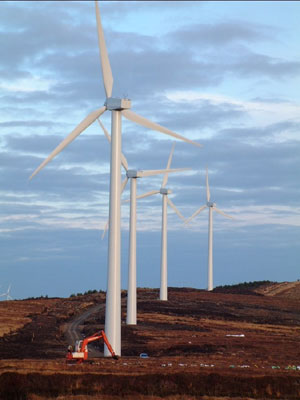| 2003 |

|
YEAR BOOK |
National University of Ireland, Galway
|
The Environmental Change Institute
|

Social and Economic Impact PRA
This programme, led by Dr Mary Cawley, has two main themes which address: (i) the social and economic ecologies evolving in the wake of continuing agricultural reform and increasing rural-urban integration; and (ii) the social, economic, cultural and political frameworks within which the use and conservation of environmental resources are organised and evolve.
One strand of this research involves a study of environmental protest politics using the Galway for Safe Environment campaign against waste incineration as a case-study. Another strand of this project assesses the political economy of sustainable energy alternatives - specifically the policy regime driving the implementation of wind energy in Ireland.
Research conducted so far has shown that it is a major challenge for environmental policy to understand that both 'environment' and 'development' are highly contested fields. The debate has been influenced by new social movements and protests as well as by the rapid development of complex and overlapping national, EU and global frameworks for environmental management and protection. Environmental protection agencies tend to see development-environment tradeoffs as technical problems, yet this research shows that technical solutions may be challenged on political, social and cultural grounds. A political economy approach emphasises the need to develop an understanding of how environmental problems link to sustainability and these, in turn, are dependent on issues of democracy and legitimacy.
This research aims to further the development of 'sustainability' as a concept in dialogue with current local, European and global debates. The increasingly complex nature of environmental policy reinforces the need for greater understanding of the politics of sustainability. The aim is to develop a more inclusive theoretical framework relevant to environmental governance. The focus on renewable energy shows how EU and Irish contexts provide different drivers and goals for sustainability.
One distinct finding is that both political decision-makers and the wider public have relatively low levels of environmental knowledge. Effective environmental governance requires better knowledge and shared political responsibility. The development of core values of sustainability, ecocentricity and active citizenship is key to a political culture that can meet environmental challenges more effectively.
Contact: Dr Su-ming Khoo, Department of Political Science & Sociology, NUI Galway; Tel: 091 524 411 (x3643); Fax: 091 525 700; E-mail: [email protected]